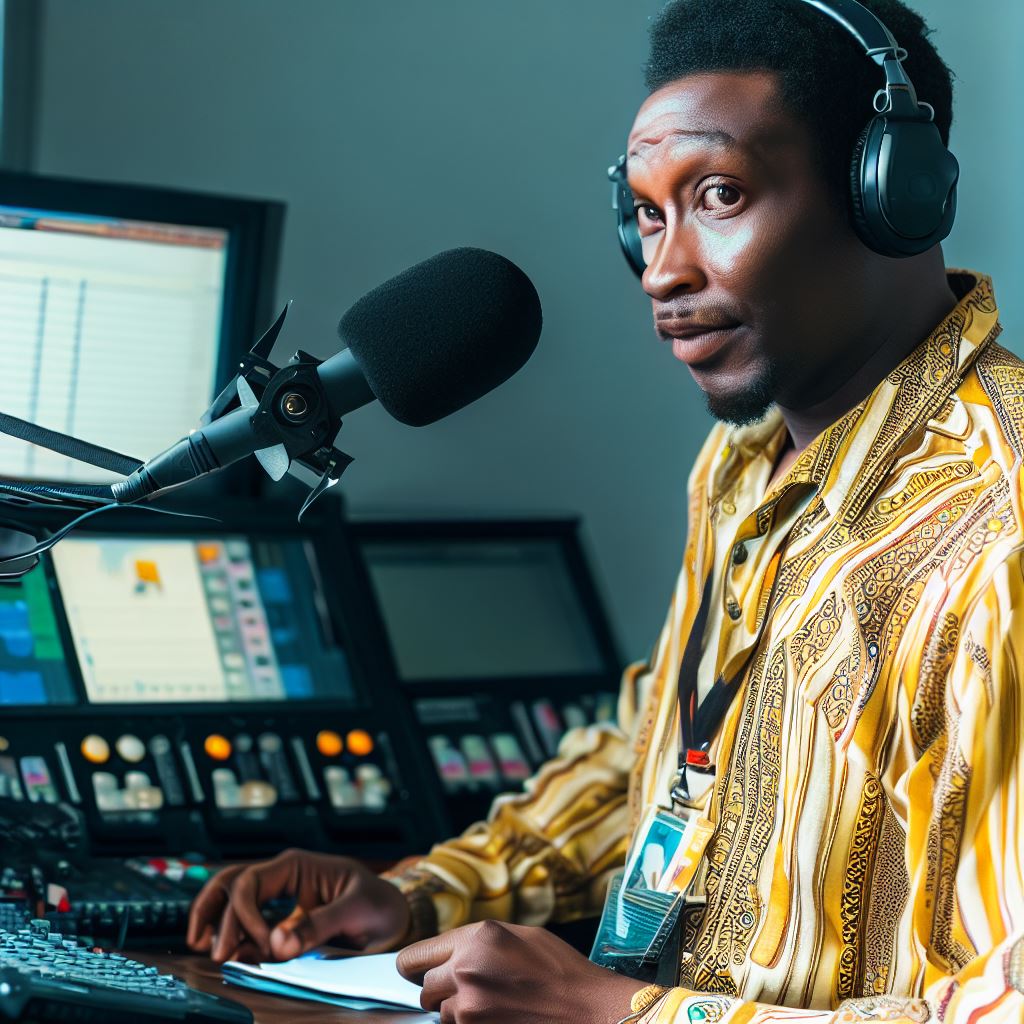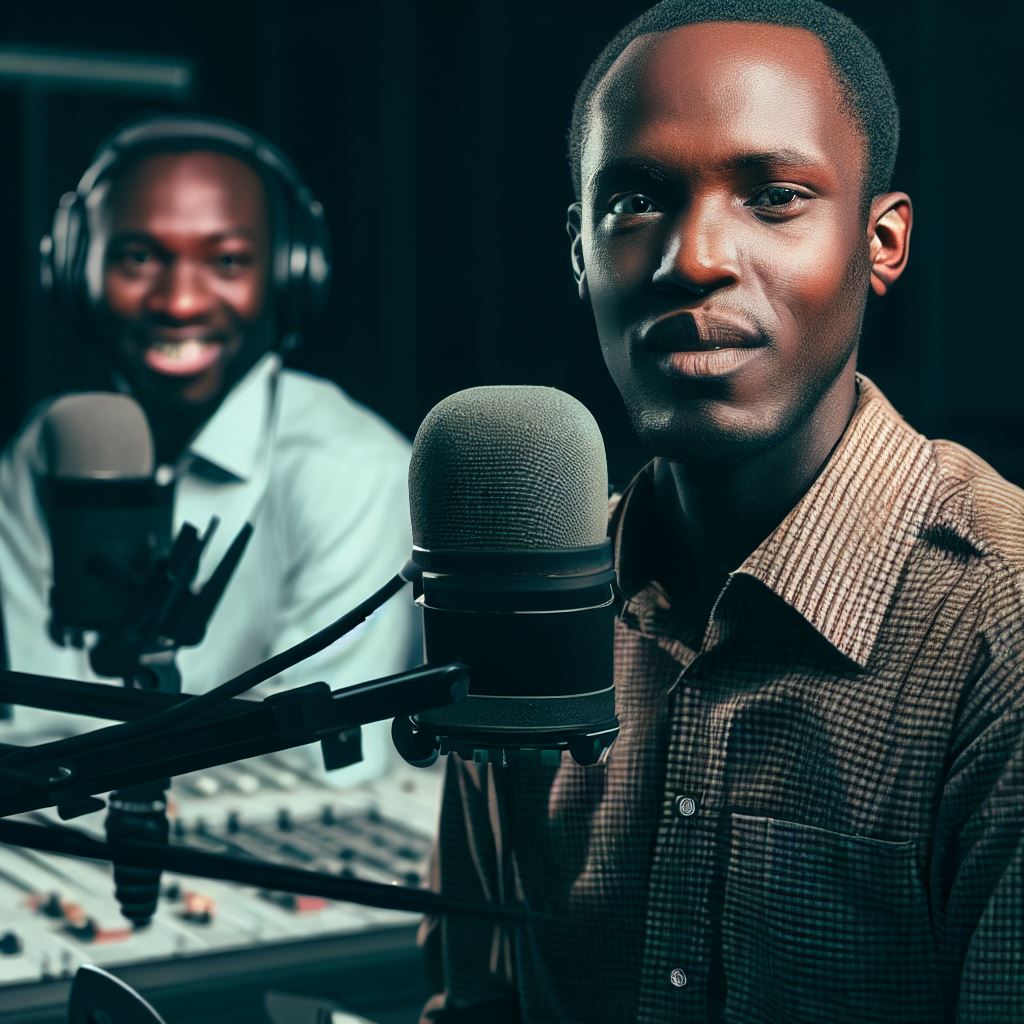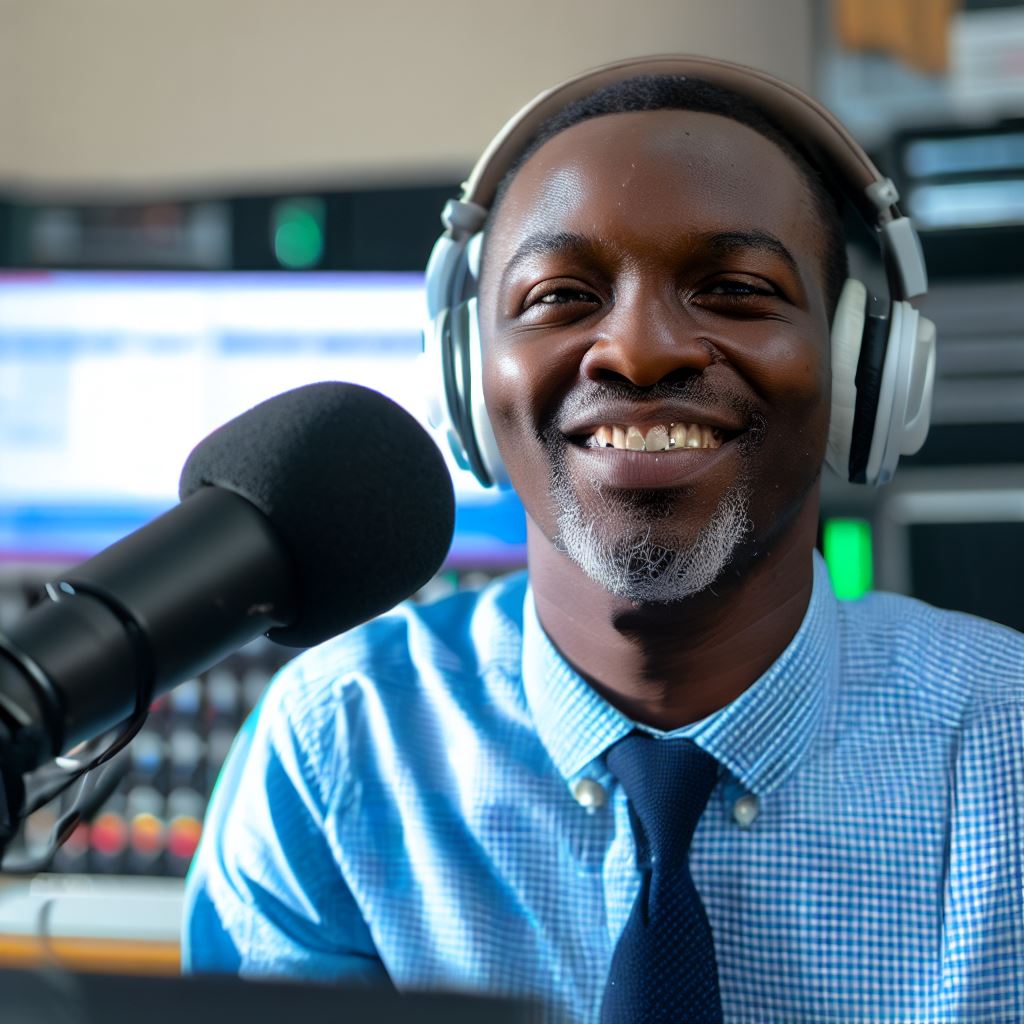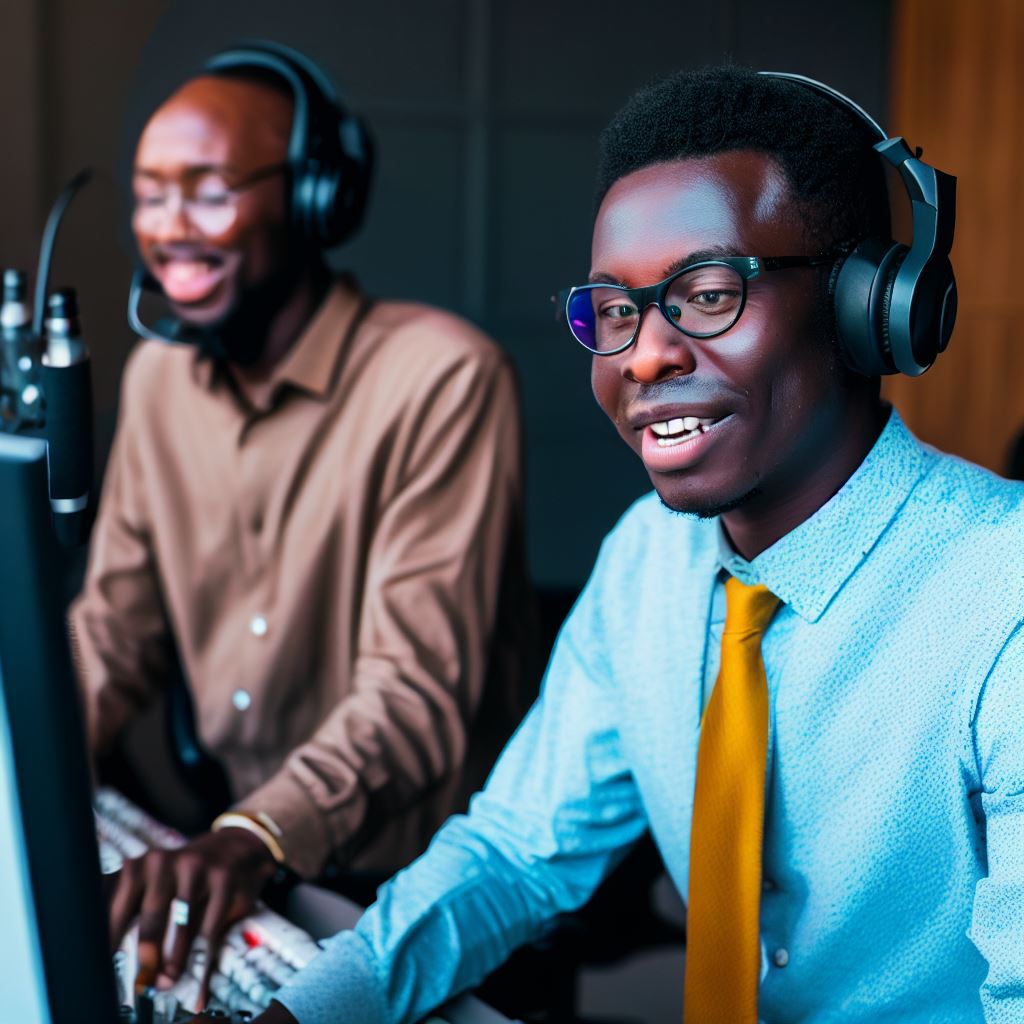Introduction
Let’s explore radio sports production tools used in Nigeria: Guide.
Radio sports production in Nigeria involves the broadcasting of sports events on radio stations. It plays a crucial role in keeping sports fans informed and entertained.
Tools used in radio sports production are essential for delivering high-quality broadcasts.
This blog post will provide an overview of these tools and their importance in Nigeria’s radio sports production landscape.
Radio sports production refers to the process of creating and broadcasting sports content on radio stations.
It involves various tasks, such as commentary, analysis, interviews, and live coverage of sporting events.
Radio serves as a vital platform for sports enthusiasts to connect with their favorite teams and athletes.
Tools are crucial in radio sports production for several reasons. They enhance the quality of broadcasts, provide accurate and up-to-date information, and create a more engaging experience for listeners.
Tools like microphones, sound mixers, and audio editing software help capture, process, and deliver sports content effectively.
This blog post will focus on the tools extensively used in radio sports production in Nigeria.
It will delve into the various equipment needed for live commentary, studio-based analysis, and interviews.
Furthermore, it will explore the significance of tools such as audio recorders and audio editing software in enhancing the overall quality of sports broadcasts.
The post will also highlight the emerging trends and advancements in radio sports production tools in Nigeria.
In fact, radio sports production in Nigeria relies heavily on the use of tools to deliver high-quality broadcasts.
These tools play a crucial role in capturing, processing, and delivering engaging sports content to listeners.
The blog post will provide a comprehensive overview of the tools used in radio sports production and their importance in Nigeria’s sporting landscape.
Microphones
In radio sports production in Nigeria, different types of microphones are used.
Each type has its advantages and disadvantages. Here are some popular microphones used:
- Dynamic Microphones: They are sturdy and can handle high sound pressure levels.
- Condenser Microphones: They offer high-resolution sound quality and are more sensitive.
- Ribbon Microphones: They capture detail and have a smooth frequency response.
Each microphone type has its own pros and cons. Here are some advantages and disadvantages:
A. Dynamic Microphones
- Advantages: Durable and can withstand rough handling, ideal for outdoor sports events.
- Disadvantages: May lack some of the finer details in sound reproduction.
B. Condenser Microphones
- Advantages: High sensitivity, captures even the tiniest nuances of sound, suitable for indoor events.
- Disadvantages: Fragile and requires careful handling, may pick up unwanted background noise.
C. Ribbon Microphones
- Advantages: Smooth frequency response, excellent transient response, ideal for capturing vocals and musical performances in sports events.
- Disadvantages: Fragile and can be easily damaged by wind or loud sound sources.
D. Tips for choosing the right microphone for specific sports events
Choosing the right microphone for specific sports events is crucial for optimal sound quality.
Here are some tips:
- Consider the venue: Indoor events may require condenser microphones, while dynamic microphones are suitable for outdoor events.
- Check the sound source: Determine whether the microphone needs to capture vocals, crowd noise, or specific sounds like bat hitting a ball.
- Consider the coverage area: Some events require a single microphone, while others may need multiple microphones to cover different areas.
- Consider budget: Different microphones have different price ranges, so consider the budget before making a purchase.
In short, microphones play a crucial role in radio sports production in Nigeria.
Understanding the types, advantages, and disadvantages can help in choosing the right microphone for specific sports events, resulting in optimal sound quality.
Read: Getting Started in Radio Sports Production: Nigeria
Mixing Consoles
A. Role of mixing consoles in radio sports production
Mixing consoles play a crucial role in radio sports production, facilitating the smooth execution of live broadcasts.
B. Popular mixing consoles used in Nigeria
In Nigeria, some popular mixing consoles used for radio sports production include:
- Yamaha MG16XU Mixing Console
- Allen & Heath QU-16 Digital Mixer
- Behringer X32 Producer Digital Mixer
C. Features and functionalities of these mixing consoles
The Yamaha MG16XU is known for its studio-quality preamps, built-in effects, and intuitive control panel.
The Allen & Heath QU-16 Digital Mixer offers flexible routing, advanced processing, and programmable scenes.
The Behringer X32 Producer Digital Mixer boasts a comprehensive set of features, including motorized faders and on-board effects.
D. How to set up and operate a mixing console effectively
Setting up and operating a mixing console effectively requires the following steps:
- Connect all necessary audio sources, such as microphones, playback devices, and external audio inputs.
- Ensure proper cable management and labeling for easy identification.
- Set the input gain levels to optimize audio quality and prevent distortion.
- Use equalization and dynamics processing to shape the sound according to the needs of the broadcast.
- Assign channels to appropriate outputs, such as main speakers, broadcast feed, or headphone mixes.
- Monitor audio levels and make adjustments as needed to maintain a balanced mix.
- Safely shut down the mixing console after use, ensuring all settings are saved and equipment is properly stored.
By using high-quality mixing consoles, radio sports production in Nigeria can achieve professional-grade sound and enhance the overall listener experience.
These mixing consoles offer a wide range of features and functionalities that allow for flexibility and precise control over the audio mix.
With the proper setup and operation, broadcasters can deliver a seamless and engaging sports broadcast to their audience.
Read: Radio Sports Production in Nigeria: Legal Aspects
Headphones
A. Importance of headphones in radio sports production
Headphones are crucial tools in radio sports production as they allow producers to monitor audio quality.
They enable the production team to ensure that the commentary, background noise, and crowd atmosphere blend seamlessly, creating an immersive experience for listeners.
B. Types of headphones commonly used in Nigeria
- Over-ear headphones: These headphones cover the entire ear, providing excellent sound isolation and a comfortable fit for extended use.
They are widely used in professional radio sports production due to their superior audio quality. - On-ear headphones: These headphones sit directly on the ear, offering a balance between sound isolation and ambient awareness.
They are portable and suitable for field reporters or broadcasters who need to be attentive to their surroundings. - In-ear monitors (IEMs): IEMs are small earphones that fit directly into the ear canal. They provide high-quality audio and are commonly used by presenters and commentators during live sports broadcasts in Nigeria.
C. Factors to consider when selecting headphones for sports coverage
- Sound quality: Look for headphones with a wide frequency response and balanced audio reproduction to ensure accurate monitoring during sports coverage.
- Comfort and fit: Opt for headphones that provide a comfortable fit for prolonged use. Adjustable headbands, cushioned earpads, and lightweight design are essential features to consider.
- Durability: Sports broadcasts can be hectic, so choose headphones that are sturdy and can withstand the rigors of outdoor use, such as robust construction materials and detachable cables.
- Noise isolation: Select headphones with good noise isolation capabilities to minimize external distractions and enhance focus on the broadcast. Closed-back designs are ideal for this purpose.
- Portability: If you require headphones for on-field reporting, consider options that are lightweight, foldable, and come with a carrying case for easy transportation.
D. Maintenance and care tips for headphones
- Clean regularly: Wipe down your headphones with a soft cloth to remove dust and dirt. Use a mild cleaning agent if necessary, and avoid spraying directly onto the ear cups.
- Keep cables organized: Avoid tangling or pulling on the cables excessively. When not in use, store headphones properly by coiling the cable in a loose, figure-eight pattern.
- Store in a safe place: Protect your headphones from physical damage by storing them in a dedicated case or pouch when not in use. Avoid leaving them in hot or humid environments.
- Handle with care: Avoid dropping or subjecting headphones to unnecessary impact. Treat them gently to prevent any internal or external damage.
- Replace worn-out parts: Over time, earpads, headbands, or cables may wear out. Ensure timely replacement to maintain audio quality and comfort.
In general, headphones are vital tools in radio sports production, providing sound monitoring capabilities.
By considering factors such as sound quality, comfort, durability, noise isolation, and portability, broadcasters can select the right headphones for sports coverage.
Regular maintenance and care will also prolong the lifespan of the headphones, ensuring continuous high-quality audio for the listeners.
Read: Salaries of Radio Sports Producers in Nigeria: Data

Audio Recorders
Audio recorders play a crucial role in radio sports production as they capture the sounds and atmosphere of live events with precision.
In Nigeria, various popular audio recorders are used to ensure high-quality recordings are obtained.
A. Role of Audio Recorders in Radio Sports Production
Audio recorders serve as the backbone of radio sports production, allowing broadcasters to document and broadcast sporting events effectively.
These tools enable producers to capture live commentary, crowd reactions, and the ambiance of the stadium or field.
B. Popular Audio Recorders Used in Nigeria
- ZOOM H4n Pro: This recorder is widely favored by radio sports producers for its exceptional audio quality and versatility.
With its dual XLR/TRS inputs, it allows for external microphones and line-level signals to be connected. - TASCAM DR-40X: Known for its user-friendly interface and built-in condenser microphones, this audio recorder is reliable and capable of capturing clear audio during sports events.
- SONY PCM-D100: This high-end portable recorder is popular for its advanced capabilities, including high-resolution recording and an extended frequency response range.
C. Features and Capabilities of These Recorders
The audio recorders used in Nigeria come equipped with several features that enhance the quality and flexibility of sports recordings:
- High-quality microphones: These recorders are equipped with built-in or external microphone options, enabling broadcasters to capture pristine audio even in noisy environments.
- Multiple recording formats: They support various file formats, such as WAV and MP3, allowing for compatibility with different radio broadcast systems.
- Extended battery life: The recorders are designed with long-lasting battery power, ensuring uninterrupted recording throughout the duration of sports events.
- Large storage capacity: They possess ample storage space, often with expandable memory options, to accommodate extended recording sessions without the need for constant transferring or deletion of files.
- Intuitive user interface: These devices are designed to be user-friendly, allowing for quick and easy adjustment of recording settings and precise monitoring of audio levels.
D. Ways to Ensure High-Quality Audio Recordings During Sports Events
Producing high-quality audio recordings during sports events can greatly enhance the listening experience for audiences.
Here are some tips to ensure optimal results:
- Positioning of microphones: Place microphones strategically to capture the sounds of the game, the commentators, and the crowd without distortion or interference.
- Utilize windshields: When recording outdoors, windshields for microphones can reduce wind noise, ensuring clarity in recordings.
- Monitor audio levels: Regularly check and adjust the audio levels to prevent clipping or distortion, especially during moments of high intensity or crowd cheering.
- Perform sound checks: Before the event begins, conduct thorough sound checks to ensure optimal microphone placement, audio settings, and overall audio quality.
- Use headphones: Monitor the audio being recorded in real-time using headphones to detect any issues or unwanted noise that may require adjustments.
By utilizing these practices alongside reliable audio recorders, radio sports producers in Nigeria can consistently deliver remarkable live broadcasts with captivating audio quality.
Read: Radio Sports Producing: Nigeria’s Emerging Careers
Broadcast Software
In radio sports production, broadcast software plays a crucial role in delivering high-quality broadcasts.
These software programs provide essential tools and functionalities that enhance the production process.
Here are some key points to consider:
A. Overview of broadcast software used in radio sports production
Broadcast software is designed to manage and automate various aspects of radio sports production.
These programs enable producers to create and customize their broadcasts efficiently.
Additionally, broadcast software helps in managing digital assets and scheduling shows.
B. Specific software programs utilized in Nigeria
In Nigeria, popular broadcast software programs used in radio sports production include PlayIt Live, RadioDJ, and StationPlaylist.
These programs are widely used due to their user-friendly interfaces and comprehensive functionalities.
They cater to both small-scale and large-scale radio stations, accommodating various broadcasting needs.
C. Key features and functionalities of these software programs
- PlayIt Live: It offers automated playlist and live broadcasting capabilities, providing seamless transitions between audio tracks.
- RadioDJ: This software program offers multi-station support, track library management, and advanced scheduling features.
- StationPlaylist: It provides extensive automation tools, including voice-tracking, playlist scheduling, and remote voice-tracking capabilities.
D. Benefits of using broadcast software for sports broadcasting:
- Increased efficiency: Broadcast software streamlines the production process, allowing producers to easily manage and organize their content.
- Improved quality: These software programs offer advanced audio processing tools, enhancing the overall sound quality of the broadcasts.
- Enhanced creativity: With features like voice-tracking and live broadcasting, producers can add their personal touch and creativity to the broadcasts.
- Smooth workflow: Broadcast software ensures seamless transitions between audio tracks, maintaining a smooth and professional broadcasting experience.
- Cost-effective: Utilizing broadcast software eliminates the need for expensive hardware and external equipment, reducing production costs.
In review, broadcast software is essential in radio sports production in Nigeria.
These software programs provide efficient tools, enhance quality, and offer several benefits to broadcasters.
PlayIt Live, RadioDJ, and StationPlaylist are just a few examples of the software programs used in Nigeria.
By utilizing broadcast software, sports broadcasters can create engaging and professional broadcasts, captivating their audience.
Conclusion
The use of radio sports production tools in Nigeria is of utmost importance.
These tools provide a platform for sports enthusiasts to stay informed and engaged.
By utilizing these tools, radio stations can deliver high-quality sports coverage to their audience, fostering a love for sports in the country.
It is crucial for radio stations and sports production teams in Nigeria to explore and embrace new technologies in order to enhance their coverage.
This will enable them to provide a more immersive and interactive experience for their audience.
Embracing new technologies such as virtual reality, interactive apps, and social media integration will undoubtedly revolutionize the way sports are broadcasted.
Therefore, the final thought is that the future of radio sports production in Nigeria lies in the hands of those willing to adopt and adapt to new technologies.
It is important to continually explore and experiment with innovative tools and techniques to stay relevant in the ever-changing media landscape.
As a call to action, we encourage our readers to share their experiences with radio sports production tools in Nigeria.
Whether you are a listener, a sports enthusiast, or a radio professional, we would love to hear your thoughts and insights.
Feel free to leave comments or questions, and let’s continue the conversation on how radio can elevate sports coverage in Nigeria.
Let us come together and work towards bringing the best sports production experience to our listeners.
Together, we can make a difference and shape the future of sports broadcasting in Nigeria.




